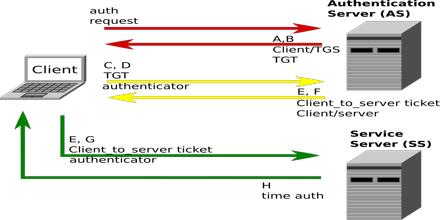Kerberos Protocol is designed to enable two parties to exchange private information across an otherwise open network. It works on the basis of ‘tickets’ to allow nodes communicating over a non-secure network to prove their identity to one another in a secure manner. Kerberos builds on symmetric key cryptography and requires a trusted third party, and optionally may use public-key cryptography during certain phases of authentication. Kerberos Protocol assumes that initial transactions between clients and servers take place on an open network in which packets transmitted along the network can be monitored and modified at will.
Kerberos Protocol
















